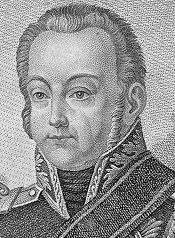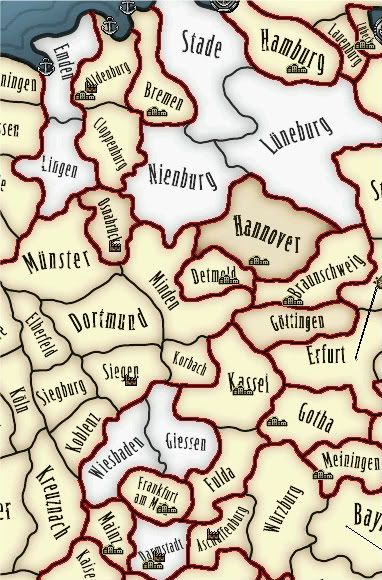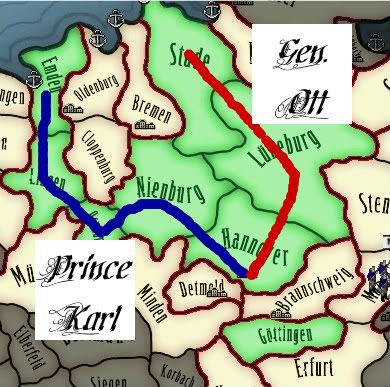Prince Karl of Hesse-Darmstadt
VII. The Hanover War: Part IV
Poor weather would keep Karl from marching his army out of Hanover for the rest of the month of December and on into January. Karl, despite being somewhat frustrated, used the time well. He worked tirelessly and conducted daily staff meetings to discuss bringing the campaign to a swift and successful conclusion. Aside from staff meetings Karl also met frequently with the army's quartermaster to ensure that his men were well supplied and as comfortable as possible, and continued his practice of touring the various camps and speaking to the soldiers, often asking them directly if they were in need of anything. On one occasion, when a group of soldiers complained that they were short of warm blankets, Karl returned within the hour and passed the much needed blankets out personally. Evidently having learned a valuable lesson after having Hessian bullets crack past his head in September, Karl's concern for the men under his command was sincere and his soldiers recognized as much. By the time that the army broke camp and marched away from Hanover, Karl's popularity with the men was soaring. The strong bond formed between the army and the young prince was one that would last the rest of his life.
The terrible weather that kept the Hessian army trapped in Hanover finally let up in early January. The army was immediately made ready to march and left Hanover behind on January 10, 1838. Just north of the city the army divided itself into two columns. Prince Karl retained command of the first column which consisted of 30,000 men while General Ott took command of the second column's 20,000 men. Karl's plan was for the two forces to split up and operate independently of one another in order for the rest of Hanover to be occupied as quickly as possible. Karl would take his army west to Lingen and then north to Emden. Ott would lead his men north with his final objective being Stade.
The intended path of the two Hessian columns in Jan. 1838
With Hanover's army having been destroyed, there was no real resistance to the Hessian advance, though in some of the more populated areas of Hanover militia forces were occasionally scraped together and tossed in front of the Hessian army. These poorly armed and trained groups were no threat to either Prince Karl or General Ott's formations, but they did make enough of a nuisance of themselves to slow down the Hessian rate of advance. Still, one by one, Hanover's major cities began to fall. By mid March, Nienburg and Luneburg had fallen and Hessian troops were at the gates of Osnabruck and Stade. Given the ever darkening situation for Hanover, Karl was not surprised when a messenger from Hanover's parliament arrived with peace terms.
The Hanoverian Parliament, which had fled to Emden and was in control of the country due to the lack of a monarch and the capture of the Viceroy in December, offered to cede Hesse-Darmstadt the provinces of Osnabruck and Nienburg in exchange for peace. Hessian war aims having been set much higher, Karl rejected the offer outright and sent the messenger back with terms of his own. Hesse-Darmstadt, his message explained, would agree to peace only after Hanover offered it's crown to the Grand Duke and became a vassal state of the Grand Duchy. Further, Hanover would release claim to all of it's territories save for the province of Hanover itself and transfer ownership of said territories to Hesse-Darmstadt.
When this message arrived in Emden, Hanover's parliament was thrown into an uproar. Faced with such a harsh peace, the parliament decided to finally take the advice of the Viceroy and sent a diplomatic mission to London. The diplomats carried a plea for funds and military assistance. In addition to this, the diplomats carried a promise that Hanover's crown would be offered to Victoria once the conflict was over.
With Hanover now offering to recognize Victoria and thus remain a part of the Empire, Great Britain finally stirred itself on behalf of the German nation. Funds were quickly sent to Hanover's parliament and an armed force began to be prepared for deployment on the continent. Rather ironically, this force was to be commanded by the very man that had nearly been offered Hanover's crown earlier in the war- Ernest Augustus, Duke of Cumberland.
Ernest Augustus fell just short of being King of Hanover
As this was all going on, Prince Karl was continuing to pursue his campaign having received no response to his peace offer. By the end of May the war's conclusion seemed in sight. General Ott had captured Stade and Karl himself was advancing on the city of Emden. The Prince's expectation was to march into the city virtually unopposed and force Hanover's parliament to accept his peace demands. Unfortunately for Karl, things would not quite work out that way. Hanover's parliament had put the money it received from Britain to good use, and had managed to arm and equip a force 20,000 strong to confront Karl's force which by now numbered around 28,000.
Advance elements of Karl's column encountered these troops just south of Emden on June 9th. Initially assuming this to be another group of local militia, Karl pressed the attack immediately. Instead of quickly dispersing, however, the Hanoverians stood their ground and as the battle grew in intensity, Karl quickly realized that he was facing a large, determined force and called for the attack to halt. He withdrew his army from the field and sent a message to General Ott in Stade asking him to join him.
While Karl waited for Ott to arrive, the two sides remained camped not far from one another. Though there was occasional skirmishing between the two forces, no major battle occurred for the rest of the month of June. On July 7th Karl received word that Ott was just a few miles off and prepared his force for battle. The Hessians moved out of their camp at 8:00am in a long battle line and began attacking Hanover's army, commanded by a veteran of the Napoleonic Wars named General Rathjen, all along it's line. As they had in the first encounter, the men of Hanover stood their ground against everything that the Hessians threw at them and as morning gave way to afternoon the Hessians had gained not one inch of ground for the blood that they had shed.
Karl's attacks had, however, not been meant to gain ground, but to hold the Hanoverian force in place. Throughout the battle the Prince had been in touch with Ott and had directed him to arrive on the flank of the enemy force. Ott's men arrived on the field at 2:00pm. Though exhausted by the morning's forced march, they enthusiastically charged onto the field and slammed into the enemy's left flank. Taken by surprise, the entire left of Rathjen's army collapsed and he was forced to order a retreat. Karl immediately began pursuit and chased Rathjen all the way to Emden. There Rathjen was able to rally his army and Karl found himself confronted by a series of defenses even more formidable than those he had faced at Hanover.
With the rest of the country under his control, Karl decided against an assault on the enemy defenses and began to settle in for a long, drawn-out battle. He would, however, find his hand forced when word reached him that 20,000 British soldiers had landed in Stade. Karl had no time to spare now. If he did not quickly defeat the Hanoverian force in front of him, the British would be able to liberate the parts of the country he had occupied. Marching against the British was not an option because Hanover's army would then be at his back, and he certainly couldn't afford a long battle in Emden because the British force would eventually arrive and trap him between it and the defenses of Emden. Karl had no illusions about the kind of losses he would suffer in storming the defenses and it was with a heavy heart that he would order the attack to begin.
Shells fall on Emden's defenses prior to the first Hessian attack
The battle raged for five days with Hessian troops being thrown back again and again. Some assaults would carry Hanoverian positions, but each time the Hessians would find themselves unable to hold their gains in the face of furious counterattacks. Losses were staggering on both sides and Karl began to fear that he would have no army left to fight the British if things continued on as they were. Perhaps due to this concern, Karl was willing to listen when a party came through the lines with a new offer of peace from Hanover's parliament. Karl read the offer- which stated that Hanover would surrender the provinces of Emden, Lingen, Nienburg, Luneburg, and Stade in exchange for peace- and asked for a period of truce while he notified the Grand Duke and awaited a response. The truce was agreed to and both sides were given a welcome respite from the terrible bloodshed of the past days. Karl's army had by this point suffered losses of 14,400 killed or wounded against losses of 13,800 for Hanover (these are totals for both the assault on Emden's defenses and the battle that had taken place just prior).
When Hanover's peace offer reached Ludwig II in Darmstadt, he called together his Council of Advisers to discuss the matter. The two main points of the discussion other than the offer itself were the arrival of the British and a letter sent by Karl explaining that while he could take Emden, he did not feel that his army would be in any condition to then begin fighting the British to a successful conclusion. The discussion was a short one as all were in agreement that, with British troops now involved, this was the best peace that they were likely to get. Though somewhat disappointed at not being able to achieve his original goal of completely subjugating Hanover, Ludwig II sent word to Karl instructing him to accept the peace offer. Karl was also instructed to ask Hanover to pay war indemnities to Hesse-Darmstadt for a term of five years, though he made it clear that Karl was to back down from that position if it became necessary to get the peace signed.

Ludwig II- Grand Duke of Hesse-Darmstadt
Upon receiving his father's response, Karl met with representatives of Hanover's parliament and explained to them his father's stipulation. Though there was some debate about it, Hanover did agree to pay indemnities and a peace was signed in Emden on August 19, 1838. The war was not over, however. The treaty that Karl signed applied only to Hanover and a state of war still existed between Britain and Hesse-Darmstadt. Karl began marching to meet the invading British army even as diplomats from both sides met to try to come to an agreement. An agreement, as it turned out, was easily reached. With the war in Punjab still dragging on, the British had little interest in fighting in Hanover, especially now that the Hanoverians had given up the fight. On August 25th, a treaty was signed in which the British recognized Hesse-Darmstadt's new territorial gains. A few days later, on August 29th, Victoria was crowned the first Queen of Hanover and British troops began to return home. The war was over and Hesse-Darmstadt could now weigh both what it had gained, and what it had lost.

The Grand Duchy of Hesse-Darmstadt (in white) after the Treaty of Emden in August 1838
















